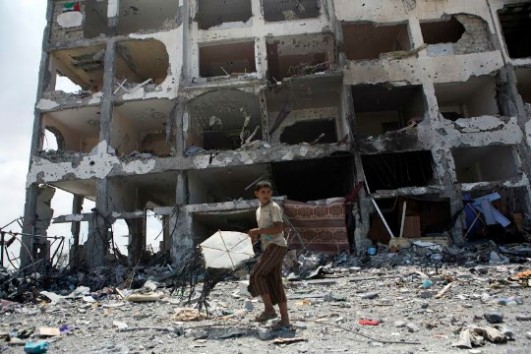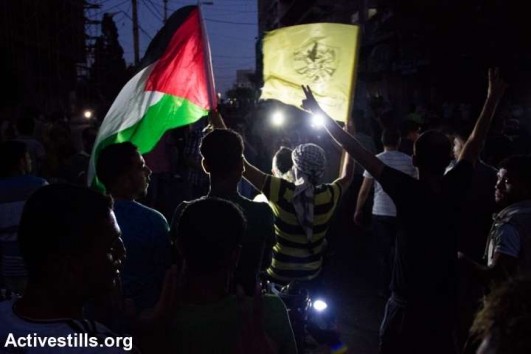Who came out of the Gaza war the victors, and who were the losers – or, rather, who lost more and who lost less?
By Talal Jabari
Another ceasefire between Israel and Hamas-led Gaza – this time costing more in terms of life and property than the last time. It will probably cost less than the next time; 2016 if the trend stays constant.
At the end of any battle, it makes sense to step back and look at the bigger picture. You want to assess who won and who lost – or at least who lost more and who lost less.
I can’t help but think of the families of the more than 2,000 Palestinians who were killed, the thousands upon thousands injured, the hundreds of thousands without homes in Gaza. Children who will grow up without parents. Parents who did what no parent should have to do, and buried their children. And all the families that need to rebuild their lives. For them this was a very costly war and there is no doubt in my mind that the civilian population of Gaza suffered the greatest loss as a result of this battle.

On a political level, Fatah in the West Bank has lost. The negative sentiment towards the Fatah leadership continues to swell and become more vocal. However, in the absence of elections and a heavy-handed security apparatus, that doesn’t mean much.
Let’s move on to the winners. At the top of the list is Hamas. Palestinians are celebrating the “victory” that Hamas delivered to its people. It’s stock on the Palestinian street is at a euphoric high, despite the tragedy on which it was built. And even more importantly, Qatar, Hamas’ main ally in the Arab world, and the host of the head of its politburo, Khaled Mashal, is now smiling down on the Islamic Resistance Movement – and that means money in the bank any day of the week.
The prolonged battle with Hamas has also strengthened right-wing extremism in Israel, which continues to manifest with impunity in acts of violence against Palestinian citizens. Politicians spout hatred and incitement that in any democracy in Europe would have them arrested; university professors and rabbis call for rape and murder, and yet maintain their positions; and thugs interpreting those words carry out attacks against more Palestinian civilians.
And of course, let’s not forget about Prime Minister Netanyahu; clearly another major victor in this battle. There are those who might argue that he should be in the loser category rather than in the winner’s circle, as he was forced to make concessions. Sure, but for how long does he really have to do so? Well, let’s look at some of those concessions.
Hamas has placed the issue of building a Gaza seaport and an airport squarely on the negotiating table. Are our memories that short? Gaza once had a functioning airport; the late Palestinian President Yasser Arafat used it while based in Gaza. And the European Union was in the midst of building a seaport. Both of these were reduced to rubble in previous spouts of violence. What’s to stop the Israeli military from doing so again? Not to mention that Israel’s blockade of the Strip includes air and sea restrictions, so I can’t imagine many people at the duty free shops of Gaza International Airport.

And fishermen will get a few extra sea kilometers in which to fish, though this is still not deep enough for significant catches. Oh, and Israel will permit access to humanitarian aid. Wasn’t it already doing that? I’ve been to the Kerem Shalom Crossing, I’ve seen trucks entering and exiting. Insufficient, you say? Well, what’s to make it different this time? A few added calories here and there?
No, Benjamin Netanyahu is clearly a victor, because Gaza remains on lockdown. He’s a victor because Hamas remains a significant force in Gaza, so the hasbara department has a continuous source of good material. Which other Palestinian group could they compare to the Islamic State?
And on a positive note, whatever concessions Netanyahu has made can be taken away with the Confucian hammer-and-fly pinpoint payloads of two F-16s. Netanyahu won, because a joint Fatah-Hamas government would have meant a decrease in tensions, and that is simply not good for business.
So it comes as no surprise that the two victors of this entire bloody scenario are the two sides that prolonged the fighting all along. But at least we have a ceasefire. Journalists will write sad stories with a glimmer of hope about how people are getting on with rebuilding their lives.
Money will pour in to Israel to restock its depleted missile stock and to reinforce the Iron Dome. Money will pour into Gaza to rebuild homes and businesses. Most of us will get on with our lives, and this episode will disappear from our social media feeds.
Gazans, on the other hand, are already wondering what price they’ll have to pay for the next ceasefire.
Talal Jabari is a Palestinian award-winning documentary filmmaker and journalist from East Jerusalem. He tweets from @TalalJabari.
Related:
What was different about this war?
War is the new system of governance (and five other Gaza takeaways)
Did Gaza win the war?
